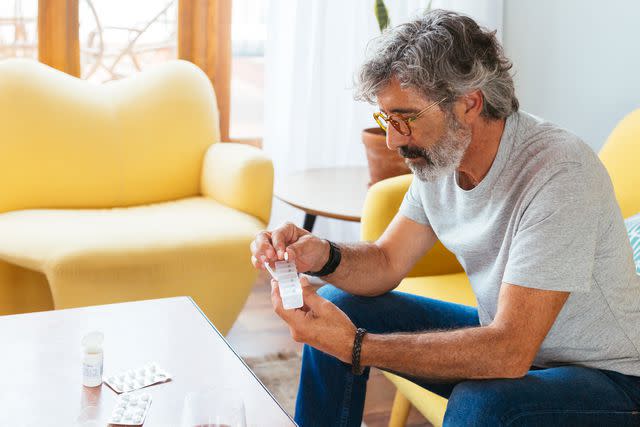Study: Daily Aspirin May Help Boost the Immune System and Prevent Spread of Colorectal Cancer
Fact checked by Nick Blackmer
Aspirin may help prevent the spread of colorectal cancer to the lymph nodes, a new study has found.
Though aspirin does come with some risks, experts say it could potentially help people with colorectal cancer.
Rates of colorectal cancer among people under 50 are rising by 2% annually.
Aspirin may play a role in colorectal cancer prevention and treatment, according to new research published in the journal Cancer.
Specifically, researchers found that people with colorectal cancer who took aspirin had less spread of the disease to their lymph nodes than those who didn’t take the drug. Aspirin also seemed to help the body’s immune system track down cancer cells.
The study comes at a time when rates of colorectal cancer, which starts in the colon or rectum, are climbing 2% per year among people younger than 50. The American Cancer Society predicts that colorectal cancer will kill more than 53,000 people in 2024, making it the second-leading cause of cancer deaths in the United States.
Other studies have shown a connection between aspirin use and colorectal cancer outcomes, but the exact mechanism behind the drug’s effect on the disease has remained unclear. The new research provides fresh insight into this mechanism, Suneel Kamath, MD, a gastrointestinal oncologist at Cleveland Clinic who was not involved in the study, told Health.
“Similar to the anti-inflammatory effects that aspirin has as an NSAID [non-steroidal anti-inflammatory drug], the [new] study seems to indicate that aspirin can adjust the immune system function so that it is more vigilant for cancer cells and will eliminate them better,” he said.
However, many questions remain about the connection between aspirin use and colorectal cancer, including who may benefit from the drug.
“Low-dose aspirin does cause a low rate of serious bleeding,” Kamath said. “Because of the bleeding risk, I don’t think we will ever recommend aspirin as a colorectal cancer prevention tool to the entire population.”
Here’s what’s known about how aspirin use might affect colorectal cancer, as well as signs of the disease you should know about.

BONNINSTUDIO / Stocksy
How Aspirin May Fight Colorectal Cancer
For the study, researchers analyzed tissue samples from 238 people who underwent surgery to treat colorectal cancer from 2015 to 2019. The patients included 148 men and 90 women who were, on average, in their early seventies.
Of the 238 patients, 12% were taking low-dose aspirin daily. None had undergone chemotherapy or radiation.
The analysis revealed that patients who had taken aspirin had less cancer spread to the lymph nodes.
The samples also showed that aspirin may have a so-called “immune surveillance effect,” Marco Scarpa, MD, PhD, study author and researcher at the University of Padova in Italy, told Health. Taking aspirin appeared to have a “greater infiltration of immune cells in the tumor,” he explained.
Scarpa’s team also treated some colorectal cancer cells with aspirin, finding that those cells also seemed to have better immune function.
Aspirin might help the body better recognize cancer cells, the researchers concluded. As Scarpa explained, taking aspirin appeared “to have improved the cells’ ability to alert other defense cells to the presence of tumor-associated proteins.”
Kamath said this finding adds another potential way aspirin might improve colorectal cancer outcomes. Previous research has suggested that aspirin may limit cancer spread because the drug blocks the aggregation of platelets, which in turn may prevent tumor cells from traveling through the blood, Kamath explained.
Related: How to Reduce Your Colon Cancer Risk
Open Questions About How Aspirin Affects Cancer
Although scientists are learning more about how consistent aspirin use might affect colorectal cancer development, there are still a lot of unknowns.
One is the impact of taking daily aspirin along with cancer treatments like chemotherapy and radiation. While Kamath doesn’t think the study results would have been different if the participants had received other treatments, he said the question would have to be studied to know for sure.
It’s also unclear how to get the most benefit from aspirin. The study authors noted that oral aspirin concentrations in the colon can be low. That suggests another method might be superior, but scientists don’t know what it might be.
“Rectal aspirin exists, but it isn’t expected that this will work any better than the pill form because the changes we are talking about aren’t due to direct contact of the drug on rectal tissue,” Kamath said. “Even when given rectally, the aspirin is absorbed into the blood and takes effect that way, the same as if you absorbed it as a pill by mouth.”
It’s also unsettled whether aspirin consumption actually improves colorectal outcomes; as an observational study, this one did not show causation but an association between the two.
To learn more about aspirin's potential benefits, Peter Kozuch, MD, site director for the hematology and medical oncology division at Mount Sinai West, told Health that clinical placebo-controlled trials, which are complex and can take decades, are necessary.
Warning Signs of Colorectal Cancer
Because colorectal cancer rates are rising among the young, Kozuch stressed that everyone should be aware of the symptoms. They include:
A change in your bowel habits
Diarrhea
Constipation
The feeling that your bowel isn’t emptying all the way
Blood in your stool
Abdominal pain (or cramping or aching) that doesn’t go away
Unexplained weight loss
If you notice any of these symptoms, Kozuch suggests contacting a doctor and requesting a diagnostic colonoscopy. Unlike a screening colonoscopy, recommended for people aged 45 to 75, this type of colonoscopy can help doctors determine what’s causing a younger person’s abnormal symptoms.
“It is so critical that we diagnose colon cancer early," Kozuch said, "and [people] should be equipped with the vocabulary to prompt a colonoscopy."
For more Health.com news, make sure to sign up for our newsletter!
Read the original article on Health.com.

